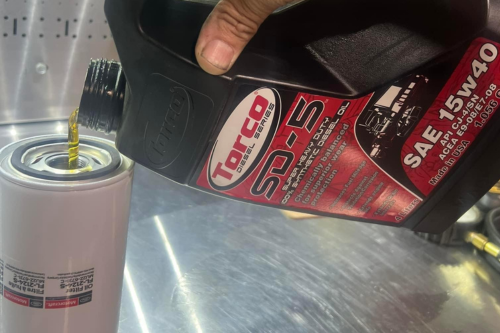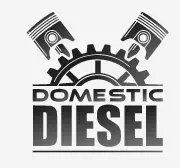
Let’s face it, you’ve got questions about your oil, and we’re here to help.
At Domestic Diesel and Automotive Services in Chino, CA, we’re your go-to auto repair shop for Powerstroke and Duramax powered diesel trucks, and we got Ernie Soliz, President at Torco USA, to answer some of the most common questions we get from our clients when it comes to their oil.
Torco USA, also known as Torco Race Fuels, is a renowned company in the motorsports industry, specializing in high-performance racing fuels and advanced lubricants and has established a legacy in producing superior quality products, including a diverse range of racing fuels and specialized lubricants designed for high-performance engines. The company is recognized for its commitment to innovation, quality, and technology.
Torco’s products are widely distributed, both in the United States and internationally, and the company is known for offering exceptional technical support and educational resources to its customers. Torco balances its focus on high performance with environmental considerations, ensuring its products meet stringent quality and environmental standards.
Domestic Diesel and Automotive Services, Chino, CA’s premier truck and auto repair shop, is an authorized dealer of Torco products.
Let’s get into those questions.
Q: Should I change the oil per manufacturer recommendations, or do I do it at 5,000 like my oil truck?
A: There are a couple ways to look at this. As much as we like to stick with the manufacturer’s recommendation for oil change intervals, there is no substitute for changing your oil. So yes, there are a few benefits to changing your oil every 5,000 miles compared to manufacturer recommendations.
If you are using a poor quality oil that is made with the lowest quality synthetic base and minimal additive system, you may deplete these additives sooner, which will lower the wear protection performance sooner, so the 5,000-mile interval makes sense.
In saying that, the other way to look at it is if you are using a super high quality diesel oil that is over-built using the highest quality of synthetic base oils and the most robust additive system, then the facto interval is perfectly fine.
Q: Can I run 5W30 in my new gas vehicle? It specs 5W20 or 0W2, but seems like a really thin oil.
A: You could change it out to the lighter grade and go, but why would you? If you have a legitimate reason to run a heavier grade than the manufacturer recommends, then yes.
For example, if you modified the engine, tuned for more horsepower, installed a turbo, supercharger, etc. – these kinds of changes may warrant going to a slightly heavier oil, but there are some details you would need to check on with an expert on the particular engine like bearing tolerances, high volume/pressure oil pumps, oil lines, etc.
In some situations, there is not a lot of difference between two consecutive grades. For instance, if an SAE 30 is built on the heavy side of the SAE 30 scale (<12.5 cSt @ 100C) and an SAE 40 is built on the lightest side of the SAE 40 scale (12.5 cSt @ 100C) an SAE 30 and an SAE 40 can be built so close that the engine would never know the difference.
Another reason to run a heavier oil than the recommended oil is if the owner’s manual gives you an option to do so. I have experienced this with a 2011 Ford F250 (diesel) and a 2010 Toyota Tacoma (gas). They both gave options for heavy duty use. The F250 recommended a 10W-30, but if you continued to read the manual, it said for heavy duty use use a 15W-40. The Tacoma manual recommended a 5W-20, but if you continued to read the manual, it said for heavy duty use, use a 5W-30.
The part that concerns me when OEMs do this, is that I believe they are just looking at fuel mileage with the recommended oils and possibly jeopardizing wear protection by doing so. Otherwise, why wouldn‘t they just assume that a truck should always be in heavy duty mode usage and therefore run the best oil for heavy duty use? This has to do with Corporate Average Fuel Economy (CAFÉ). Government getting involved in automotive technical decisions. This is another conversation for another day.
Q: Why is my oil black when I check my oil right after an oil change?
A: Diesel produces a lot of byproducts, mainly soot (charcoal-like substance), during the combustion process. This byproduct turns the oil super dark in what seems like a matter of minutes. It is a normal occurrence and should not be alarming. A good quality diesel will contain the correct amount of detergents to make sure this soot does not adhere to parts and will include the correct amount of dispersants that will keep these foreign bodies in suspension until the next time you change your oil. Some of the soot can be so fine that it does not get trapped in the oil filter, so the only way to get rid of it is an oil change.
A good quality diesel oil will also contain a high TBN (Total Base Number), which refers to the amount of neutralizer agent in the oil to help neutralize any acids that may form due to the sulfur content in the diesel fuel.
Q: What’s the difference between conventional, synthetic blend and synthetic oils?
A: Let me start with this – there are five groups of base oils – Group l, Group II, Group III, Group IV and Group V. Here’s the simple explanation – Groups I and II are mineral-based oils. Groups III, IV and V are synthetic-based oils.
Groups I and II are made from refined crude oil. Group III is also made from refined crude oil, but it is put through a hydrogen gas process (Hydrofinishing), which makes it so clean and so pure. When it is complete, it nearly mimics a Group IV. It is so pure and clean now and performs at a very high level that it falls into the title of a synthetic.
Groups IV and V are made from chemical compounds that are artificially modified or synthesized. So they can be made using chemically modified petroleum components, just not the whole crude oil. They can also be synthesized from other raw materials.
A Group IV is a PAO (polyalphaolefin).
A Group V is:
- Conventional oil could be referred to as mineral, petroleum, dinosaur and probably few more.
- Synthetic Blend oil could be referred to as synthetic/petroleum blend, semi-synthetic, blend and probably a few more.
- Synthetic oil could be referred to as full synthetic and 100% synthetic
Q: Does viscosity really affect mpg in the real world?
A: It can. If you think about the dynamics within an engine and how the engine may have to work harder to move all the engine parts when using a heavier, slower-moving oil. With a lighter, faster-moving oil, the engine would not use as much energy to move everything, so it would free up power. That sounds great, but that lighter, faster-moving oil may not protect like it should and the extra freed up horsepower may be short-lived.
What I’m saying is do not choose a light oil just because you think it may give you better MPG. Choose an oil that gives you both MPG and wear protection. This means the correct viscosity for the vehicle, along with the correct additive system to protect the engine long term.
Typically, building an oil is a balancing act. If you try to sway too far in one direction (MPG), you may compromise wear protection. If you try to sway too far in wear protection, you may compromise MPG. So buy a well-built and balanced engine oil.
Q: What’s the shelf life of oil?
A: There is not a shelf life or an expiration date attached to engine oil bottle labels. If they are stored properly in a dry temperature controlled area, they can last for many years. If you are ever in question if an oil is too old to use, just buy new.
Q: Do I need to run special oil in my eco boost F150 (2.7/3.5 direct injected turbo)?
The oil is not really special by any means. It just has a certain specification on it. Some of the late model DI engines suffered from LSPI (Low Speed Pre Ignition). The API SN Plus specification that addresses LSPI.
The specs for DI engines have been the same for many years now. These specifications were approved for these engines because they lower the occurrences of LSPI. They do not eliminate it. To receive this spec, typically the calcium and magnesium were reduced. Well, these components make up a good portion of the detergency package. So you see how it works. You address one area and it may neglect another area.
I still believe an overbuilt oil designed to address all areas of the engine is best.
Visit Domestic Diesel and Auto Service for Your Oil Change Services
Thank you to our friends at Torco USA for taking the time to answer your oil-related questions. If you’re in need of an oil change or other preventative maintenance, please contact Domestic Diesel and Auto Service for your diesel trucks, gas vehicles, and more. Call us today at (909) 627-0500 or visit us at 4588 Carter Ct., Chino, CA 91710.


